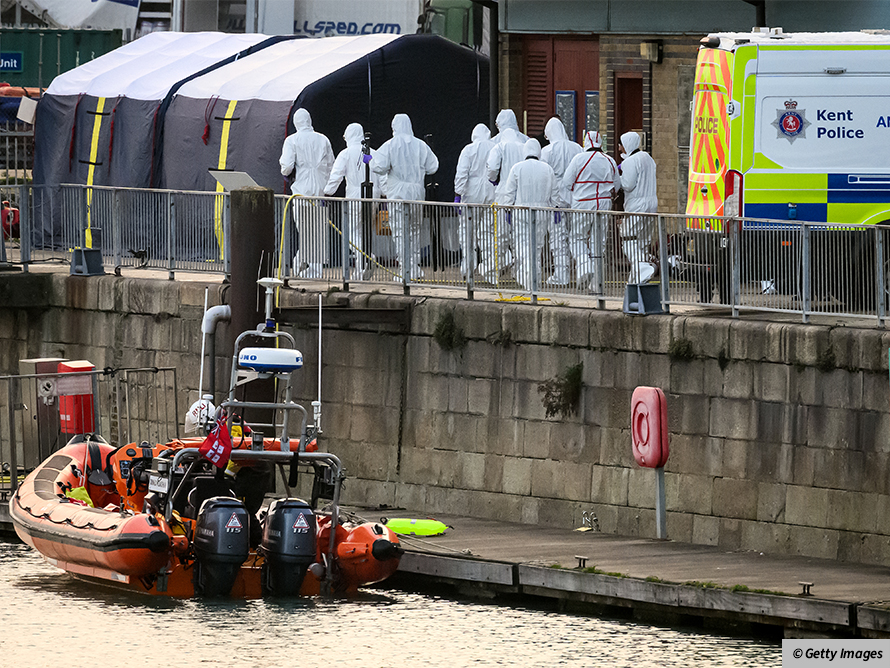Are rich countries to blame? "Please help. We are in the water." A desperate call from a sinking boat leads to a dramatic rescue that puts migration policy in the spotlight.
Horror as migrants drown in the dead of night
Are rich countries to blame? "Please help. We are in the water." A desperate call from a sinking boat leads to a dramatic rescue that puts migration policy in the spotlight.
It was 3 o'clock at night when the fishermen found them. Mid-way between France and the Dover coast in the world's busiest shipping lane. No place for an inflatable dinghy, overcrowded and sinking in ice-cold water.
Yesterday morning in pitch dark, a two-hour operation rescued 31 migrants in the English Channel. At least four people died.
The grave news comes a day after UK prime minister Rishi Sunak said Britons had a "right to be angry" about the number of people crossing the Channel to seek asylumWhen a state agrees to shelter somebody who is fleeing dangerous circumstances. The right to asylum is protected in international law by the 1951 Refugee Convention.. He plans to overhaul the system to deport more migrants and deter others from arriving in small boats.
The Strait of Dover is 34km wide. So far this year, over 40,000 migrants have paid smugglers to cross in small unseaworthy vessels.1 The worst disaster on record was last November when 27 people died after a dinghy capsized.
Globally, an estimated 281 million people are on the move.2 And as they flee conflict, poverty and environmental disasters, many risk their lives to reach safety and security.
Who is to blame? The UK government vows to "destroy the business model" of people smugglers and economic migrants "gaming the system".
Rishi Sunak believes "enough is enough" and has promised to make it harder for undocumented migrants to open bank accounts, live and work in the UK. In addition, he has signed a deal to deport people to Albania.
These policies "will cause more suffering", warn Medecins Sans Frontiers. Closing safe pathways to asylum forces people to risk their lives in the boats of smugglers.
This tragedy is "the government's own making", says Steve Crawshaw from the charity Freedom from Torture. Instead of blaming migrants, rich nations should tackle the reasons people leave their homes. And help those in need.
Rishi Sunak decries boats "full of illegal immigrants". The American journalist Jose Antonio Vargas says, "I am here illegally, without legal status" is a fact. But "people can't be illegal", and calling them so is "factually inaccurate" and "irresponsible".
Others argue we must entirely rethink the legal system that distinguishes refugeesAnyone fleeing conflict or persecution is defined as a refugee by the UN as a refugee, regardless of where they are from. from economic migrants. One study predicts that by 2070, up to three billion may be displaced by the effects of climate change.3 National borders, writes journalist Gaia Vince, may not be "fit for the 21st Century".
Are rich countries to blame?
Yes: People will always take risks to escape war, poverty and insecurity. If rich countries want fewer migrants, they must make the world more equal. Stronger borders will only lead to more deaths.
No: Ultimately, people smugglers are responsible for migrants drowning. They put lives in danger and benefit financially from desperate people seeking safety. They should take full responsibility.
Or... Blaming one factor for this tragedy is too simplistic. Every migrant has a story, with different reasons for leaving home and moving to another country.
Keywords
Asylum - When a state agrees to shelter somebody who is fleeing dangerous circumstances. The right to asylum is protected in international law by the 1951 Refugee Convention.
Refugees - Anyone fleeing conflict or persecution is defined as a refugee by the UN as a refugee, regardless of where they are from.
Horror as migrants drown in the dead of night
 Smuggled: People rescued from the boat said they had paid £5,000 for a place in the unsafe vessel.
Smuggled: People rescued from the boat said they had paid £5,000 for a place in the unsafe vessel. Glossary
Asylum - When a state agrees to shelter somebody who is fleeing dangerous circumstances. The right to asylum is protected in international law by the 1951 Refugee Convention.
Refugees - Anyone fleeing conflict or persecution is defined as a refugee by the UN as a refugee, regardless of where they are from.
